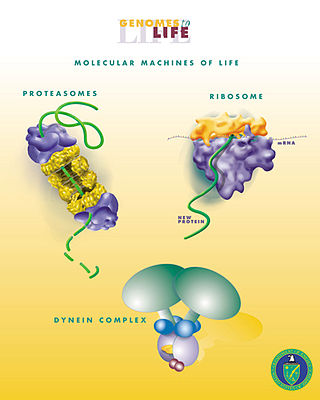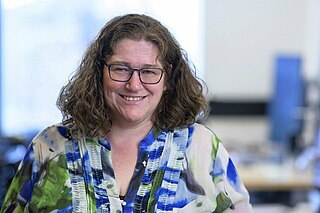
Pharmacology is a branch of medicine, biology, and pharmaceutical sciences concerned with drug or medication action, where a drug may be defined as any artificial, natural, or endogenous molecule which exerts a biochemical or physiological effect on the cell, tissue, organ, or organism. It is the science of drugs including their origin, composition, pharmacokinetics, therapeutic use, and toxicology. More specifically, it is the study of the interactions that occur between a living organism and chemicals that affect normal or abnormal biochemical function. If substances have medicinal properties, they are considered pharmaceuticals.

The National Institute of General Medical Sciences (NIGMS) supports basic research that increases understanding of biological processes and lays the foundation for advances in disease diagnosis, treatment, and prevention. NIGMS-funded scientists investigate how living systems work at a range of levels, from molecules and cells to tissues and organs, in research organisms, humans, and populations. Additionally, to ensure the vitality and continued productivity of the research enterprise, NIGMS provides leadership in training the next generation of scientists, in enhancing the diversity of the scientific workforce, and in developing research capacity throughout the country.

In biology and other experimental sciences, an in silico experiment is one performed on computer or via computer simulation. The phrase is pseudo-Latin for 'in silicon', referring to silicon in computer chips. It was coined in 1987 as an allusion to the Latin phrases in vivo, in vitro, and in situ, which are commonly used in biology. The latter phrases refer, respectively, to experiments done in living organisms, outside living organisms, and where they are found in nature.
Biomedicine is a branch of medical science that applies biological and physiological principles to clinical practice. Biomedicine stresses standardized, evidence-based treatment validated through biological research, with treatment administered via formally trained doctors, nurses, and other such licensed practitioners.

The Max Planck Institute for Biophysical Chemistry, also known as the Karl-Friedrich Bonhoeffer Institute, was a research institute of the Max Planck Society, located in Göttingen, Germany. On January 1, 2022, the institute merged with the Max Planck Institute for Experimental Medicine in Göttingen to form the Max Planck Institute for Multidisciplinary Sciences.

The Jackson Laboratory is an independent, non-profit biomedical research institution which was founded by Clarence Cook Little in 1929. It employs more than 3,000 employees in Bar Harbor, Maine; Sacramento, California; Farmington, Connecticut; Shanghai, China; and Yokohama, Japan. The institution is a National Cancer Institute-designated Cancer Center and has NIH Centers of Excellence in aging and systems genetics. The mission of The Jackson Laboratory is "to discover the genetic basis for preventing, treating and curing human diseases, and to enable research and education for the global biomedical community."
A biomedical scientist is a scientist trained in biology, particularly in the context of medical laboratory sciences or laboratory medicine. These scientists work to gain knowledge on the main principles of how the human body works and to find new ways to cure or treat disease by developing advanced diagnostic tools or new therapeutic strategies. The research of biomedical scientists is referred to as biomedical research.

Biological engineering or bioengineering is the application of principles of biology and the tools of engineering to create usable, tangible, economically viable products. Biological engineering employs knowledge and expertise from a number of pure and applied sciences, such as mass and heat transfer, kinetics, biocatalysts, biomechanics, bioinformatics, separation and purification processes, bioreactor design, surface science, fluid mechanics, thermodynamics, and polymer science. It is used in the design of medical devices, diagnostic equipment, biocompatible materials, renewable energy, ecological engineering, agricultural engineering, process engineering and catalysis, and other areas that improve the living standards of societies.

The College of Biological Sciences (CBS) is one of seven freshman-admitting colleges at the University of Minnesota. Established in 1869 as the College of Science, the College of Biological Science is now located across both the Minneapolis and the St. Paul campuses. The current interim dean is David Greenstein.

The Centre for Neuroscience and Cell Biology (CNC) is a nonprofit research institute founded in 1990, aiming to foster research in biomedicine and biotechnology and multidisciplinary graduate teaching at the University of Coimbra. CNC was the first established “Laboratório Associado” in Portugal, and it has steadily increased the scope of scientific competences over the years, with a strong focus on the exploitation of the fundamental mechanisms of ageing and brain diseases.

Lawrence E. Hunter is a Professor and Director of the Center for Computational Pharmacology and of the Computational Bioscience Program at the University of Colorado School of Medicine and Professor of Computer Science at the University of Colorado Boulder. He is an internationally known scholar, focused on computational biology, knowledge-driven extraction of information from the primary biomedical literature, the semantic integration of knowledge resources in molecular biology, and the use of knowledge in the analysis of high-throughput data, as well as for his foundational work in computational biology, which led to the genesis of the major professional organization in the field and two international conferences.

Linda Gay Griffith is an American biological engineer, and Professor of Biological Engineering and Mechanical Engineering at Massachusetts Institute of Technology, where she also directs the Center for Gynepathology Research.
Systems medicine is an interdisciplinary field of study that looks at the systems of the human body as part of an integrated whole, incorporating biochemical, physiological, and environment interactions. Systems medicine draws on systems science and systems biology, and considers complex interactions within the human body in light of a patient's genomics, behavior and environment.
Cancer systems biology encompasses the application of systems biology approaches to cancer research, in order to study the disease as a complex adaptive system with emerging properties at multiple biological scales. Cancer systems biology represents the application of systems biology approaches to the analysis of how the intracellular networks of normal cells are perturbed during carcinogenesis to develop effective predictive models that can assist scientists and clinicians in the validations of new therapies and drugs. Tumours are characterized by genomic and epigenetic instability that alters the functions of many different molecules and networks in a single cell as well as altering the interactions with the local environment. Cancer systems biology approaches, therefore, are based on the use of computational and mathematical methods to decipher the complexity in tumorigenesis as well as cancer heterogeneity.

Dana Pe'er, Chair and Professor in Computational and Systems Biology Program at Sloan Kettering Institute is a researcher in computational systems biology. A Howard Hughes Medical Institute (HHMI) Investigator since 2021, she was previously a professor at Columbia Department of Biological Sciences. Pe'er's research focuses on understanding the organization, function and evolution of molecular networks, particularly how genetic variations alter the regulatory network and how these genetic variations can cause cancer.
Network medicine is the application of network science towards identifying, preventing, and treating diseases. This field focuses on using network topology and network dynamics towards identifying diseases and developing medical drugs. Biological networks, such as protein-protein interactions and metabolic pathways, are utilized by network medicine. Disease networks, which map relationships between diseases and biological factors, also play an important role in the field. Epidemiology is extensively studied using network science as well; social networks and transportation networks are used to model the spreading of disease across populations. Network medicine is a medically focused area of systems biology.
D. Lansing Taylor is the Director at the University of Pittsburgh Drug Discovery Institute (UPDDI), Pennsylvania and a faculty member in the Department of Computational and Systems Biology.

Christopher S. Chen, born in 1968, is an American biological engineer. He is the William Fairfield Warren Distinguished Professor of Biomedical Engineering at Boston University and member of the Wyss Institute for Biologically Inspired Engineering at Harvard University in Boston.

Peter Karl Sorger is a systems and cancer biologist and Otto Krayer Professor of Systems Pharmacology in the Department of Systems Biology at Harvard Medical School. Sorger is the founding head of the Harvard Program in Therapeutic Science (HiTS), director of its Laboratory of Systems Pharmacology (LSP), and co-director of the Harvard MIT Center for Regulatory Science. He was previously a Professor of Biology and Biological Engineering at the Massachusetts Institute of Technology where he co-founded its program on Computational and Systems Biology (CSBi). Sorger is known for his work in the field of systems biology and for having helped launch the field of computational and systems pharmacology. His research focuses on the molecular origins of cancer and approaches to accelerate the development of new medicines. Sorger teaches Principles and Practice of Drug Development at Massachusetts Institute of Technology and Harvard University.












